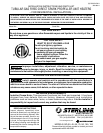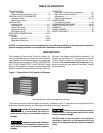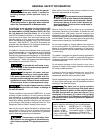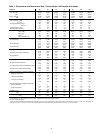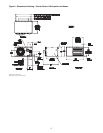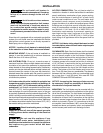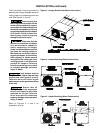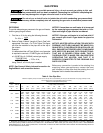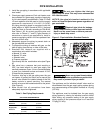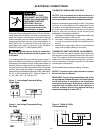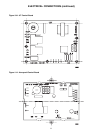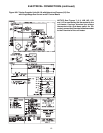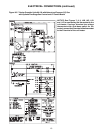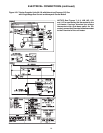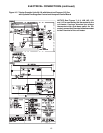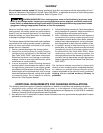
6
INSTALLATION
Do not install unit heaters in
corrosive or fl ammable atmospheres! Premature
failure of, or severe damage to the unit will
result!
Avoid locations where extreme
drafts can affect burner operation. Unit heaters
must not be installed in locations where air
for combustion would contain chlorinated,
halogenated or acidic vapors. If located in such
an environment, premature failure of the unit will
occur!
Since the unit is equipped with an automatic gas ignition
system, the unit heater must be installed such that the
gas ignition control system is not directly exposed to
water spray, rain or dripping water.
NOTICE: Location of unit heaters is related directly
to the selection of sizes. Basic rules are as follows:
MOUNTING HEIGHT: If the unit heater is installed in a
garage, it must be installed with a minimum clearance
above the fl oor of 18 inches (457mm).
AIR DISTRIBUTION: Direct air towards areas of
maximum heat loss. When multiple heaters are involved,
circulation of air around the perimeter is recommended
where heated air fl ows along exposed walls. Satisfactory
results can also be obtained where multiple heaters are
located toward the center of the area with heated air
directed toward the outside walls. Be careful to avoid all
obstacles and obstructions which could impede the warm
air distribution patterns.
Unit heaters should not be installed to maintain low
temperatures and/or freeze protection of buildings. A
minimum of 50°F (10°C) thermostat setting must be
maintained. If unit heaters are operated to maintain lower
than 50°F (10°C), hot fl ue gases are cooled inside the
heat exchanger to a point where water vapor (a fl ue gas
by-product) condenses onto the heat exchanger walls. The
result is a mildly corrosive acid that prematurely corrodes
the aluminized heat exchanger and can actually drip water
down from the unit heater onto fl oor surface. Additional
unit heaters should be installed if a minimum 50°F (10°C)
thermostat setting cannot be maintained.
Should overheating occur, or the gas
supply fail to shut off, shut off the manual gas valve
to the appliance before shutting off the electrical
supply.
Do not use this appliance if any
part has been under water. Immediately call a
qualifi ed service technician to inspect the appliance
and replace any gas control which has been
underwater.
AIR FOR COMBUSTION: The unit heater shall be
installed in a location in which the facilities for ventilation
permit satisfactory combustion of gas, proper venting,
and the maintenance of ambient air at safe limits
under normal conditions of use. The unit heater shall
be located in such a manner as not to interfere with
proper circulation of air within the confi ned space. When
buildings are so tight that normal infiltration does not
meet air requirements, outside air shall be introduced
per Sections 1.3.4.2 and 1.3.4.3 of ANSI Z223.1 for
combustion requirements. A permanent opening or
openings having a total free area of not less than
one square inch per 5,000 BTU/Hr (1.5 kW) of total
input rating of all appliances within the space shall be
provided.
NOTICE: Unit Heater sizing should be based on heat
loss calculations where the unit heater output equals
or exceeds heat loss.
CLEARANCES: Each Gas Unit Heater shall be located
with respect to building construction and other equipment
so as to permit access to the Unit Heater. Clearance
between vertical walls and the vertical sides of the Unit
Heater shall be no less than 1 inch (25.4mm). However,
to ensure access to the control box and fan, a minimum
of 18" (457mm) is required for the fan, and control box
side. A minimum clearance of 1 inch (25.4mm) must be
maintained between the top of the Unit Heater and the
ceiling. The bottom of the Unit Heater must be no less
than 1 inch (25.4mm) from any combustible. The distance
between the flue collector and any combustible must
be no less than 1 inch (25.4mm). Also see AIR FOR
COMBUSTION and VENTING sections.
NOTICE: Increasing the clearance distances may
be necessary if there is a possibility of distortion or
discoloration of adjacent materials.
MOUNTING: The Unit Heater may be mounted with the
vent outlet, gas and electrical connections to the right or
left of the air moving fan. The Unit Heater is shipped with
the connections to the right of the fan when looking in
the direction of the air fl ow. If connections to the right are
required, remove hanger brackets from face of unit and
attach as pictured in Figure 3. If connections to the left
are required, invert the heater (180°), mount the hanging
brackets as above, and remove, invert, and replace the
control access panel and the air discharge louvers.



